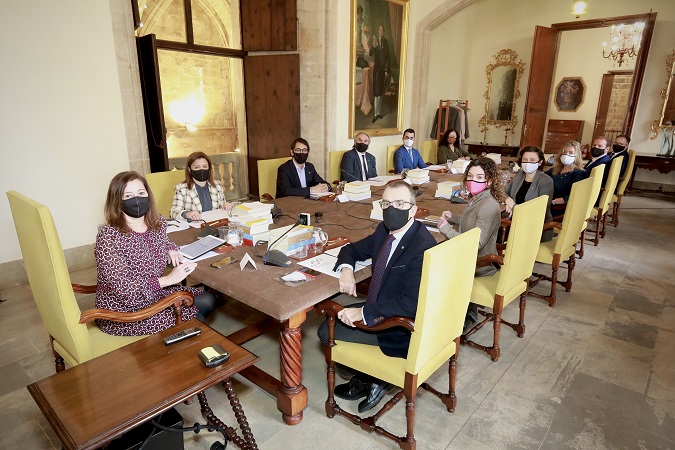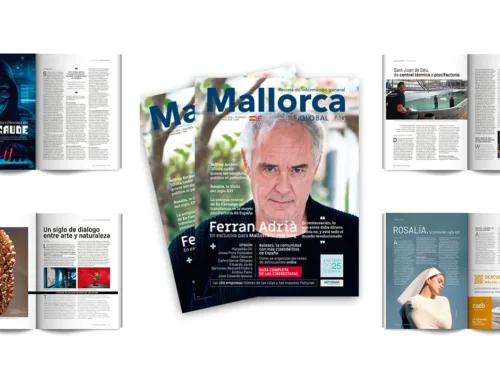The Consell de Govern has today approved a decree law for circularity and sustainability in tourism that will promote the modernization and transformation of the sector, requiring companies to take pioneering measures in environmental sustainability and labor rights. The rule includes a freeze on new tourist places for the next four years to “improve the quality of life of residents and the tourist experience of visitors” and an investment of 60 million euros.
Thus, during this time it will not be possible to buy new seats from the stock exchanges of Mallorca, Eivissa and Formentera. In the case of Menorca, which does not have a pool of places, the freeze is applied for new offers. During these four years, the Island Consells will be able to determine, through their island territorial plans, whether these vacancies are recovered or allowed to expire.
This new regulation foresees, therefore, a decrease in places, a fact that the President of the Government, Francina Armengol, has defined during the presentation of the Decree Law as a path “towards balance and environmental, social and economic sustainability”.
This moratorium affects hotel rooms and tourist rentals, which in the case of the Mallorca, Eivissa and Formentera stock markets right now add up to a total of 18,718, of which 8,486 correspond to Mallorca, 7,000 to Eivissa and 3,232 to Formentera.
The president explained that this decree law, which will not only be validated in Parliament, but will also be processed as a bill and will be open to contributions from all parliamentary groups, has the objective of ensuring that the Balearic Islands “continue in the vanguard of tourism”, being “the first circular tourist destination in the world” and a destination “reference in how workers are taken care of, who are the ones who make us leaders in tourism”.
In addition to thanking the work done by all the agents involved in the drafting and negotiation of this decree law, Armengol has assured that in the Government “we know that we approve demands that imply investments for the tourism sector and we know that in recent years they have experienced a complex economic situation.
Four axes and an investment of 60 million euros
The new regional tourism regulations will entail a public investment of 60 million euros in aid to the sector. The regulation is divided into four axes:
Social and economic sustainability
The law establishes the quality of employment and the quality of life of people as a starting point, with measures that make tourism also socially sustainable. In this sense, protection will be increased for chambermaids, a group highly affected by workplace accidents. From 2023, establishments must install elevating beds (mechanical or electrical) to facilitate their work, a measure that involves renovating 300,000 beds and from which more than 20,000 chambermaids will benefit. Establishments will have 6 years to adapt to the regulations.
Circularity and environmental sustainability
The decree law is committed to a circular economy, for which all companies will be required to have a circularity plan, which will make the Balearic Islands a pioneering destination when it comes to standardizing this issue.
The companies must carry out an evaluation of the management of the resources and waste generated each year and, based on this evaluation, they will prepare a plan every 5 years where they will stipulate the reduction objectives and the investments, practices and protocols necessary to meet them.
In this line, circularity will cover aspects such as food, the use and care of water, waste or clean energy. Among the guidelines that will be established around these issues, in the field of food, the use of species classified within endangered categories will be prohibited and the traceability of fish and shellfish of Balearic origin will be established as mandatory.
Territorial sustainability
The third axis of the regulations will maintain the commitment to the environment and the protection of the territory will remain firm. In addition to blocking tourism growth by freezing places, the legal text links reforms in tourist establishments to new limitations and requires a 5% reduction in tourist places by the establishment as a precondition. The reform files will be authorized by means of a responsible declaration.
Modernization and administrative simplification
Finally, in addition to the modifications related to social/economic, environmental and territorial sustainability, the new law presents a series of improvements in the field of administrative simplification and modernization.
In this way, the standard updates the criteria to achieve a new hotel classification adjusted to the new times, which will clearly bet on the quality of the service. Thus, the standards of the lower categories are increased and the requirements are modernized, so that from now on the criteria related to the televisions in the rooms will include the requirement that they have access to digital content and the availability of loudspeakers will be assessed Wireless in the rooms.
In addition, new requirements are established for tourist homes, since from May 2023 they must have a registration book that will record the date and the identification of the person responsible for guaranteeing the mandatory services established by law for this type. establishments, such as regular cleaning or maintenance of facilities.
The rule also states that all hostels, pensions, campsites and tourist homes must maintain optimal hygiene and cleanliness conditions as well as keep their mechanisms and facilities in perfect working order and updated. In exchange, they will no longer be subject to the obligation to pass the modernization plans.
Infringements and sanctions
The new legal text establishes a sanctioning regime in case of non-compliance or administrative infractions. Thus, Failure to comply with the maximum period established for the installation of elevating beds will be sanctioned with 500 euros for each bed not installed.
Not having all the supporting documentation for the preparation of the Circularity Plan will be sanctioned with a fine of 100,000 euros, while not indicating in a differentiated way on the letter, menu or similar, both seafood and fish products that have Balearic origin will be sanctioned with a requirement or fine of up to 1,000 euros.
The rest of infractions, such as failing to comply with the obligation to eliminate thermal installations, not having a double button in the toilets or making use of species classified as endangered for food consumption, will be sanctioned with fines of between 4,000 and 40,000 euros.

El Consell de Govern aprobó por decreto la ley turística. Foto: GOIB.







Leave A Comment